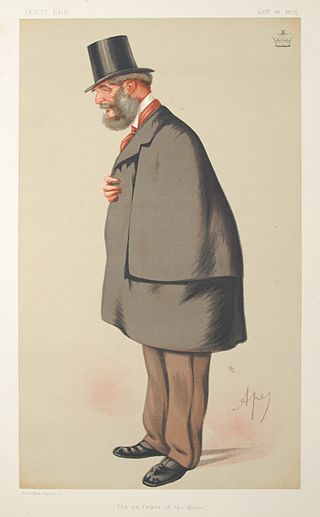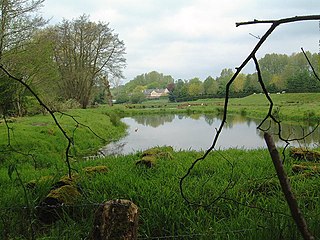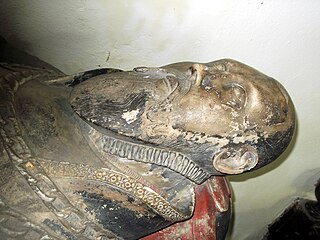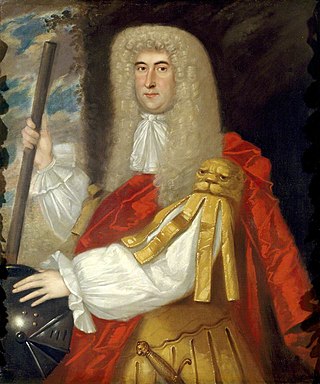Baron Forester, of Willey Park in the County of Shropshire, is a title in the Peerage of the United Kingdom. It was created on 17 July 1821 for Cecil Weld-Forester, who had previously represented Wenlock in the House of Commons. Born Cecil Forester, he assumed the additional surname of Weld by royal licence in 1811. His son, the second Baron, also represented Wenlock from 1790 in Parliament, and later served in the Tory administration of Sir Robert Peel as Captain of the Honourable Corps of Gentlemen-at-Arms from 1841 to 1846.
John Slany, Slaney or Slanie, etc., was an English merchant and ship builder of Shropshire origins who became Master of the Merchant Taylor's Company in 1620, and was the first and only Treasurer of the Newfoundland Company, chartered in 1610.
The Weld family may refer to an ancient English family, and to their possible relations in New England, an extended family of Boston Brahmin. An early record of a Weld holding public office, is of the High Sheriff of London in 1352, William. In the 16th and 17th centuries people called Weld and living in Cheshire began to travel and to settle in the environs of London, in Shropshire, in Suffolk and thence in the American Colonies, and in Dorset. While most of the Welds of England had adopted Protestantism, the exception was all three sons of Sir John Weld of Edmonton, who married into elite recusant families, thus reverting, with their descendants, to Roman Catholicism. The noted Catholic Weld lineage, unbroken till the new millennium, is that of Lulworth Castle in Dorset.
John George Weld Weld-Forester, 2nd Baron Forester PC, was a British Tory politician. He served as Captain of the Honourable Corps of Gentlemen-at-Arms under Sir Robert Peel from 1841 to 1846.

George Cecil Weld-Forester, 3rd Baron Forester PC, styled The Honourable George Weld-Forester between 1821 and 1874, was a British Conservative politician and army officer. He notably served as Comptroller of the Household in 1852 and from 1858 to 1859. A long-standing MP, he was Father of the House of Commons from 1873 to 1874, when he succeeded his elder brother in the barony and took a seat in the House of Lords.
Cecil Weld-Forester, 1st Baron Forester was a Tory British Member of Parliament and later peer.

Cecil Theodore Weld-Forester, 5th Baron Forester, was a British peer and Conservative Member of Parliament, styled The Honourable from 1886 to 1894.
Reverend Orlando Watkin Weld Weld-Forester, 4th Baron Forester, known until 1886 as the Honourable Orlando Weld-Forester, was a British peer and Church of England clergyman.
George Forester was Member of Parliament for the borough constituency of Wenlock on several occasions between 1758 and 1785.
Brooke Forester was the long-serving Member of Parliament for the borough constituency of Wenlock from 1739 and 1768.
Sir William Forester KB, of Dothill Park, Apley Castle, and Watling Street in Wellington, Shropshire was a Whig politician who sat in the English and British House of Commons between 1679 and 1715.
The Weld family are a cadet branch, arisen in 1843, of the English Welds of Lulworth. It is an old gentry family which claims descent from Eadric the Wild and is related to other Weld branches in several parts of the United Kingdom, notably from Willey, Shropshire and others in the Antipodes and America. A notable early Weld was William de Welde, High Sheriff of London in 1352, whose progeny moved in and out of obscurity.

Kerswell Priory was a small Cluniac priory in the parish of Broadhembury in Devon, England.

Sir Richard Newport was an English landowner and politician of Shropshire origin, prominent regionally during the mid-Tudor and early Elizabethan periods.

George Bromley was an English lawyer, landowner, politician and judge of the Mid-Tudor and Elizabethan period, a member of an important Shropshire legal and landed gentry dynasty. Although his career was overshadowed by that of his brother Thomas Bromley, George Bromley was of considerable importance in the affairs of the Welsh marches and the Inner Temple. He was an MP for Liskeard 1563, Much Wenlock in 1558 and 1559 and Shropshire in 1571 and 1572.
Weld is a surname of Anglo-Saxon English and Dutch origin.

John Wolryche (c.1637–1685) was a lawyer and politician of landed gentry background who represented Much Wenlock in the House of Commons of England in two parliaments of Charles II. He was a moderate Whig, opposing the succession of James II but avoiding involvement in conspiracies.

Sir John Weld was a wealthy landowner and London merchant, the son of a Lord Mayor of London and the father of the branch of the Weld family which became settled at Lulworth Castle in Dorset. He was a charter member and Council assistant of the Newfoundland Company of 1610.
Sir John Weld (1613–1681), of Chelmarsh and Willey, Shropshire was an English politician who sat in the House of Commons in 1679.
Barrow is a civil parish in Shropshire, England. It contains 28 listed buildings that are recorded in the National Heritage List for England. Of these, three are listed at Grade I, the highest of the three grades, three are at Grade II*, the middle grade, and the others are at Grade II, the lowest grade. The parish contains the settlements of Barrow, Willey, Benthall, and Linley, and is otherwise completely rural. Four of the listed buildings are churches, two of which are at Grade I, and two at Grade II*. The other Grade I listed building is a country house. The rest of the listed buildings include farmhouses and farm buildings, other houses and cottages, a row of almshouses, a bridge, a chest tomb in a churchyard, and a war memorial.









